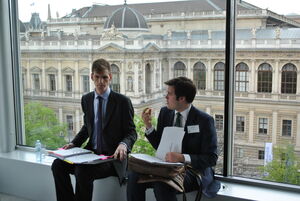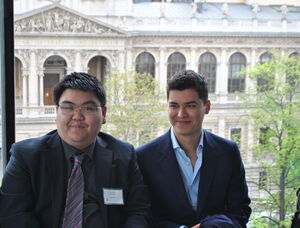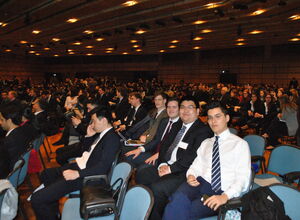Willem C Vis Moot
Petya Ilieva, PhD candidate at The City Law School, and former coach of the City Vis team talks us through the very unique experience of the Willem C. Vis International Commercial Arbitration Moot.
The arbitration week in Vienna, which during the years has turned into one of the major events in the field of international commercial arbitration, is over.
The 21st Willem C Vis International Commercial Arbitration Moot (the Vis Moot) has finished. The awards and honourable mentions have been granted and published. The students have finally put faces to the big names in the area of international commercial arbitration, names that they have cited in their memorandums and at the oral hearings in Vienna. Now, in the light of the past event, it is time for striking a balance and starting preparation for the new season.
The Moot

The Vis Moot is a competition for law students. It is being advertised as exceptional student experience and I cannot agree more with this statement. Going back to Vienna for a third consecutive year and participating in three different roles – as a student, an arbitrator and a coach – demonstrates the power of attraction of this competition. The Vienna Moot has many faces and phases and students can and have to learn to benefit from all of them.
The Vis Moot is the most prominent competition of its sort in the field of international private law. Its success is so big that a twin moot has been launched a couple of years ago to ease the participation of students living in the Eastern Hemisphere. The Vis Moot East takes place in Hong Kong and traditionally starts two weeks before the moot in Vienna. The Hong Kong Moot shares the same Problem and Rules with the Vienna Moot. This is one of the reasons why some teams going to Vienna, also participate in the Vis Moot East – to test their arguments, presentation skills and team work. It should be noted that, while Vis Moot East is not a regional elimination moot for the Vienna Moot, students cannot argue in both the Hong Kong and the Vienna Moot in the same year. Students pleading on the Vis Moot East, however, can be on the teams going to the Vienna Moot.
Both Vis Moot and Vis Moot East welcome law students from all over the world. Students that are eligible to participate may come from a law school or from any other higher education institution that includes law as part of its program of study. Those that have been licensed to practice law, however, are not eligible to participate, however, unless the Director of the Moot grants an exception.
The Problem
The Problem for the Moot is released in early October via publishing on the Moot’s web site. The teams have to prepare two memorandums before the oral hearings in Vienna, respectfully Hong Kong – one memorandum on behalf of the Claimant (due before the winter seasonal holidays) and one memorandum on behalf of the Respondent (due at the end of January after the seasonal holidays). The time between the last submission and Vienna is an intensive one as the teams prepare their presentations, work on the advocacy skills, test and amend their arguments, attend pre-moots, etc. Indeed, one of the features that make Vis Moot such a successful competition is the fact that it allows for the development and improvement of students’ arguments. Although the facts of the Problem are set and students are not allowed to complement or amend them, the former can change, to a certain extent, their arguments during the competition. In their very first hearing teams are expected to rely on the arguments presented in their written memorandum or, where they do not adhere to their statements, to be able to justify why the position has been abandoned. As the Moot progresses, the students will not be considered bound by their written submissions as the arguments will improve.

The City Team
This year’s Vis team from City University London has been carefully selected from all students on LLB, GDL, BPTC and LLM courses. Those that succeeded in the selection process were:
David Green (GDL) Edoardo Lupi (GDL) Richard Briggs (BPTC) Justin Wong (LLB)
The diversity of the students in terms of their level of studies complemented their work as everyone relied on versatile skills and knowledge to contribute to the team’s progress. Due to the tight schedule for submission of the memorandums, the four students were divided to work in groups of two from the very beginning of the competition, as Richard and Justin were working on the issues dealing with the law governing the jurisdiction of the arbitral tribunal to decide the case and those arising out of the parties’ arbitration agreement, while David and Edoardo focused on the law governing the merits of the case.
The Work, the Work, the Work
If you ask a student about their impressions of the Vis Moot just after the arbitration week in Vienna, they will most probably talk for hours about the amazing time they have had at the oral submissions and forget to mention the high price at which the latter have come, namely a lot of work and dedication to studying the intricacies of international sales law and international commercial arbitration.
Harry Flechtner, Professor of Law at University of Pittsburgh School of Law and a contributor to the development of the Vis Moot for many years, has succeeded to express the amount of work that has to be done for the competition in a very whimsical and lyrical way in the famous ‘The Mootie Blues’, which he presents himself every year at the opening ceremony in Vienna:
-
- Well I'm a Vis mootie, baby. I work that problem day and night.
- Yes I'm a Vis mootie, baby. Writin' memos til dawn's light.
- I don't ever take no break - yea, the moot gave my social life the blight.
- […]
-
- Well you're a Vis mootie, baby. You're in the library 'til it's closed.
- Yes you're a Vis mootie, baby. That problem's got you engrossed.
- The only time you get high is when you climb up to the Dachgeschoss.
-
- When you got to Vienna, you found mooties everywhere.
- They were all bright and good looking -fancy clothes and nice hair.
- And since you hadn't had a date since stars first shone in the night above,
- That's when you realized that you're in the moot for love.
-
- Cause you're a Vis mootie, baby. You just moot 'til you're blind.
- Well your team may advance, but your love life has been left behind.

Indeed, the time invested for preparation for the Vienna competition is enormous. On one hand, this is because of the various skills that are being tested at the Vis Moot. Although, students’ advocacy skills are in the spotlight in Vienna, there are awards and honourable mentions for best written memorandums. The written work that has to be produced is not to be underestimated – each of the two memorandums to be submitted has to be up to 35 pages long.
Attention is paid not only to the legal arguments – their persuasiveness and presentation, but also to the style of writing, use of legal terminology, and even formatting. It should be noted here that arbitrators are not penalizing the students for imperfections in their command of English; however, my experience shows that coating is as important as the substance itself. And this is not because the arbitrators are being picky, but because the competition in Vienna is fierce – to be among the best, one has to strive for the best.
On the other hand, Vis Moot requires a lot of preparation because of the peculiarities of the areas that the Problem touches upon, namely international sales law and international commercial arbitration. Regarding the former, it needs to be clarified that the Problem is always constructed in such a way that the UN Convention on Contracts for the International Sale of Goods is allegedly applicable to the case.
As to the latter, the mere fact that different laws (rules) can be applicable to (i) the sale contract, (ii) the arbitration agreement, (iii) the arbitral process, (iv) the procedure for enforcement of the arbitral award or (v) the procedure for setting aside the arbitral award, can be both inspiring and challenging to the students. The advantages of getting to understand such peculiarities, however, outweigh the difficulties that students may encounter during their preparation.
Pre-Moots
There is one other side of the Vis Moot concerning the performance of the students, that is rarely being commented on, but which is becoming ever more important. This is the issue of (preoccupation with) attending pre-moots. More and more teams are going on ‘pre-moot sprees’, participating in various pre-moots, enrolling in summer courses for Vis Moot preparation, attending events designed at facilitation of the preparation for the Vienna Moot. Although, every experience should be viewed as an asset and investment from which the students can benefit, it is to be questioned whether Vis Moot is not turning into a business adventure leaving behind its simple, crusade cause – to introduce students to the field of international sales law and arbitration for resolution of international business disputes.
It needs to be mentioned here, that there are alternatives to the expensive pre-moot sprees and these are the online pre-moots. The latter can be arranged easily and can operate even without the help of special conference equipment. This year was the launch of the Pace-IICL Vis Online Pre-Moot, in which teams could register for free and practice their arguments using the software platform provided by the Pace Law University. I expect initiatives like this one to become more common and start changing the face of the ‘traditional’ pre-moot practices. The City Vis team participated in one online pre-moot and took part in the first of its kind City Vis Pre-moot hosted by City University London.
Vienna Experience

The one week in Vienna is the quintessence of the Vis moot experience when students realize it was all worth it. It is also the most intensive time – time to practice the submissions, continue the research, alter the faulty arguments, get rid of useless and unpersuasive statements, work on the presentations skills, pay attention to the team work, add modulation to the voice, keep the eye contact, think of an opening statement, summon the arguments in a catchy theme, use expressive phrases and analogies, keep a good speech pace, mind one’s body language, give structure to the submissions, cite applicable authorities, avoid confronting the arbitrators, and present the arguments. Yes, it is not an easy task, but it is an interesting and a beneficial one and it can be fun.
Each team argues four times, twice as claimant and twice as respondent. The City Vis team had one hearing a day, although a team can be scheduled to argue twice on the same day with no argument on one of the three other days of the general rounds. After every oral hearing the team gathered for de-briefing, where comments and feedback on the presentations were given. David, Edoardo, Richard and Justin used the rest of the day to practice, further research relevant issues and look for case law.
It was pleasure to work with all of them during this academic year. The four of them went to Vienna as students and came back as a team – with honed skills, supportive of each other and well-equipped for future legal battles. The team also fostered the development of students’ personal skills and abilities. David Green was distinguished with an honourable mention for a best oralist.
The Future Team
City Law School is very proud of the success of its students at the Vienna Moot this year. We are already looking forward to the start of the new Vis Moot season and the selection of the new City Vis team. Everyone is welcome to consider joining the City Vis team and benefiting from the exceptional Vis Moot experience. Participation at the Vis Moot not only fosters students’ knowledge in the areas of international sales law and international commercial arbitration, but also develops their research skills, advocacy and communication skills, interpersonal, management, team-working and leadership skills.